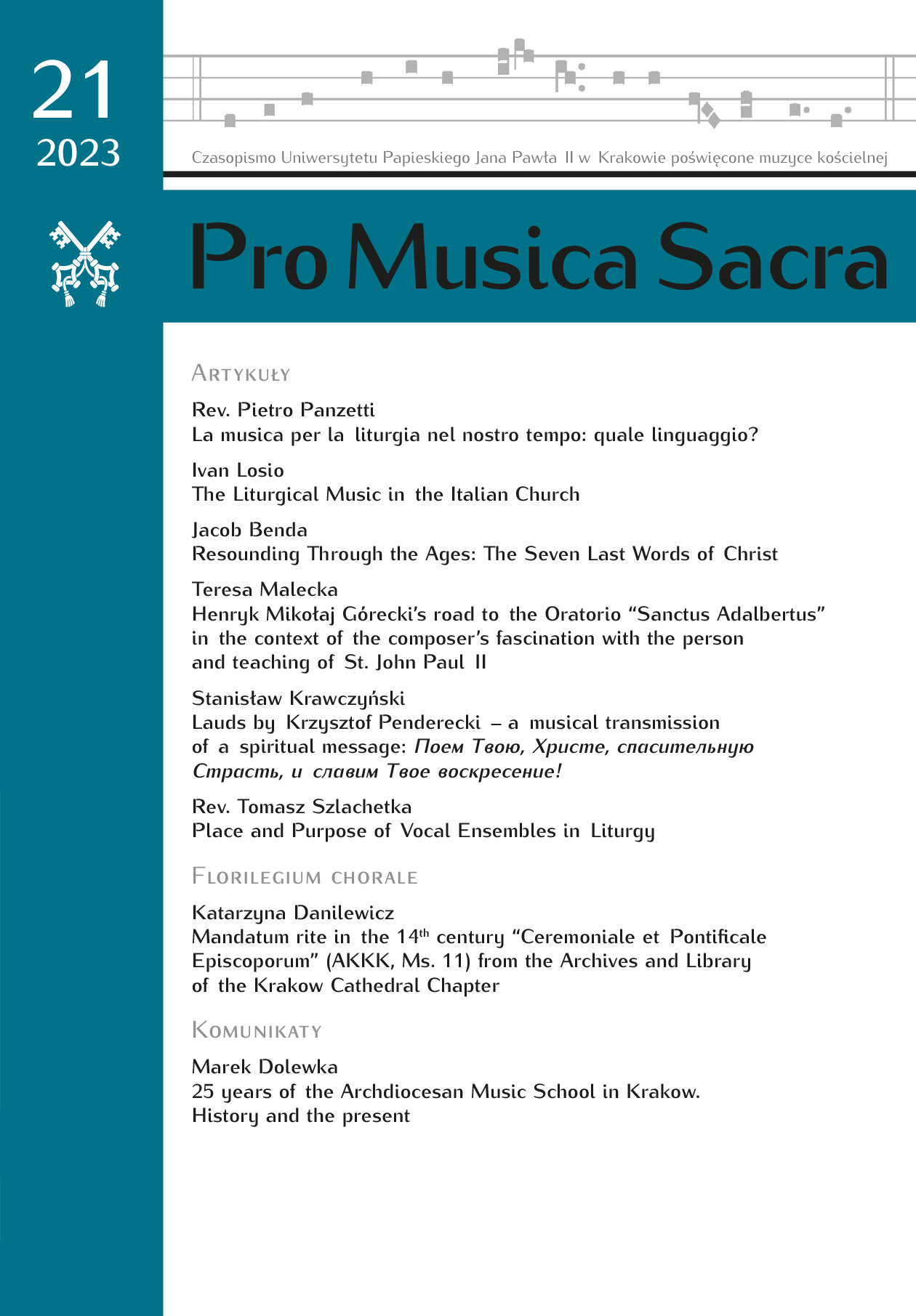Lauds by Krzysztof Penderecki – a musical transmission of a spiritual message: Поем Твою, Христе, спасительную Страсть, и славим Твое воскресение
DOI:
https://doi.org/10.15633/pms.2105Słowa kluczowe:
Penderecki, Lauds, Orthodox church musicAbstrakt
The centre of research interest described in the article is the analysis of the relationship of the work of the eminent Polish composer Krzysztof Penderecki, LAUDS I – Złożenie do grobu (Laying in the Tomb) and LAUDS II – Zmartwychwstanie (Resurrection), with the texts of the Orthodox rite of Good Friday and Holy Week Saturday. The first part of the article presents the political and historical context of the work, its influence on the choice of content and form of composition. The liturgical coherence of Penderecki’s three works is presented: St Luke’s Passion and both Lauds, as a unity combining the cohesiveness of the Paschal themes. The construction of the work itself according to the division into individual parts is discussed. Each is placed within the liturgical, timbral and semantic layers of the Holy Week liturgy and discussed in terms of its musical construction, which makes use of extremely varied and often unconventional means of artistic expression. The article concludes that Krzysztof Penderecki’s Lauds, being an artistic – not liturgical – work, subordinates the text of the service to musical needs, using it as an inspiration for the spiritual values subsequently contained in the music. It is difficult, therefore, to find in it the preservation of the liturgical canon, or its setting in the direct course of an Orthodox Paschal service. Rather, one should seek, translated into musical language, the values contained in the prayer layer of the Good Friday and Saturday rites. Crucial for all the considerations carried out in the article are the rela[1]tions between the verbal layer of the service and the form and musical layer of the work, which is an unprecedented, until then, artistic approach to the Easter rite. The whole is illustrated with examples taken from the scores of the work, referring to the descrip[1]tions presented in the article.
Bibliografia
Passio artis et vitae. Z Krzysztofem Pendereckim rozmawiają Anna i Zbigniew Baranowie, in: K. Penderecki, Labirynt czasu. Pięć wykładów na koniec wieku, Presspublika, War szawa 1997, p. 65–82.
Passio et mors Domini nostri Jesu Christi secundum Lucam Krzysztofa Pendereckiego, „Ruch Muzyczny” (1966) nr 10, p. 3–7.
Biblia Tysiąclecia, Wydawnictwo Pallottinum, Poznań 2021.
Casel O., La Fête de Pâques dans l’Éeglise des Pères, Éditions du Cerf, Paris 1963 (Lex orandi, 37).
Janowska K., Mucharski P., Rozmowy na nowy wiek, vol. 1, Wydawnictwo Znak, Kraków 2002.
Malecka T., Krzysztof Penderecki a kultura prawosławia w perspektywie intertekstualnej, in: K. Penderecki, Muzyka ery intertekstualnej studia i interpretacje, Akademia Muzyczna, Kraków 2005, p. 65–86.
Pobrania
Opublikowane
Numer
Dział
Licencja

Utwór dostępny jest na licencji Creative Commons Uznanie autorstwa 4.0 Międzynarodowe.
Autorzy publikujący w czasopiśmie udzielają jego wydawcy zgody o następującej treści:
- Autor zachowuje autorskie prawa majątkowe do utworu, a jednocześnie udziela wydawcy czasopisma zgody na jego pierwszą publikację w wersji drukowanej i wersji online na licencji Creative Commons Uznanie autorstwa 4.0 Międzynarodowe oraz zgody na wykonywanie opracowań, w tym przekładów.
- Autor ma możliwość udzielania zgody niewyłącznej na opublikowanie utworu w wersji, która ukazała się w czasopiśmie (np. zamieszczenia go w repozytorium instytucjonalnym lub opublikowania w książce), wraz z informacją o jego pierwszej publikacji w czasopiśmie.
- Autor może umieścić swój utwór online (np. w repozytorium instytucjonalnym lub na swojej stronie internetowej) jeszcze przed zgłoszeniem utworu do czasopisma.

